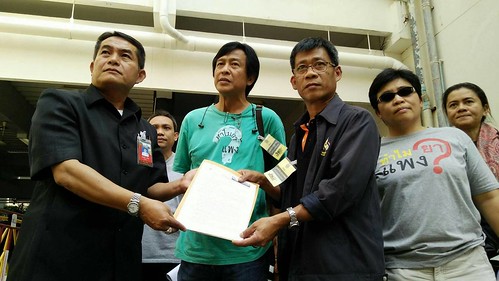Civil society groups oppose the junta’s plan to use the regime’s absolute power to speed up the process of registering pharmaceutical patents, warning the plan could cost billions of baht in increased drug costs.
On 1 March 2017, FTA Watch, a civil society group monitoring trade policies, and AIDs Access Foundation (AAF) submitted a letter to Gen Prayut Chan-o-cha, the junta leader and Prime Minister, urging him not to use Section 44 of the Interim Constitution to bypass normal regulations in registering pharmaceutical patents.
The action from the group came after the National Council for Peace and Order (NCPO) concluded in a recent meeting that the regime would use its absolute power to register 12,000 pharmaceutical patents within three months.
The conclusion was reached after the Department of Intellectual Property (DIP) and the Ministry of Commerce proposed that the junta use Section 44 to ease the process of registering patents for 20,000 medicines which have already been registered in other countries.
The DIP reasoned that the proposal will tackle violations of intellectual property rights, adding that a special mechanism will be implemented to prevent the prices of 3,000 medicines from getting too expensive.
AAF and FTA, however, pointed out that the proposal will make it easier for pharmaceutical companies to monopolise the market and could cause an unprecedented rise in drug prices as patented drugs are 3-10 times more expensive than generic drugs.
Clopidogrel, a medicine that is used to reduce the risk of heart disease and stroke in those at high risk, is 25 times more expensive than its generic version, the group illustrated.
They further argued that pharmaceutical companies, most of them American and European, requesting the DIP to patent their medicines do not substantially change the composition of the original medicines.
Chalermsak Kittitrakul, an AAF campaigner, said the lengthy process of patenting medicines does not result from how slowly the DIP functions, but from the pharmaceutical companies themselves.
He said the 1979 Patent Act states that the pharmaceutical companies have up to five years to patent new drugs after they are invented, but most choose not to submit patent requests until the end of the time limit to prevent the DIP from thoroughly checking the authenticity of the new drugs.
The group concluded that the plan also clearly contradicts Article 9 (4) of the Patent Act, which states that inventions related to the medical treatment of human beings or animals are not protected by the act.
Citing research of the Health System Research Institute, FTA Watch pointed out that if 59 common drugs whose producers are requesting patent protection from 1996-2028 were granted patent protection by the DIP, the government would have to pay about 8.4 billion baht more in drug costs.

Representatives of FTA Watch and AAF submit a letter on 1 March 2017 urging the junta premier not to use Section 44 of the Interim Constitution to bypass normal regulations for registering pharmaceutical patents
Prachatai English is an independent, non-profit news outlet committed to covering underreported issues in Thailand, especially about democratization and human rights, despite pressure from the authorities. Your support will ensure that we stay a professional media source and be able to meet the challenges and deliver in-depth reporting.
• Simple steps to support Prachatai English
1. Bank transfer to account “โครงการหนังสือพิมพ์อินเทอร์เน็ต ประชาไท” or “Prachatai Online Newspaper” 091-0-21689-4, Krungthai Bank
2. Or, Transfer money via Paypal, to e-mail address: [email protected], please leave a comment on the transaction as “For Prachatai English”
